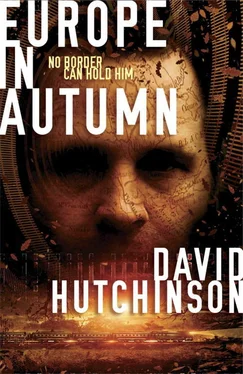“You could have told me where we were going,” Rudi said as they drove towards the city centre.
“I could have,” Fabio agreed. “But we are fated to go through life with too little information anyway. The sooner you learn that the better.”
Rudi looked at him. “Was that supposed to be a joke?”
“After two and a half months of your cooking,” Fabio said, “one develops a certain wry sense of humour.”
RUDI HAD NEVER been to Poznań before, but Michał, Max’s maitre d’, had been born in a village not too far outside the city, and on slow homesick evenings he had regaled the restaurant’s captive audience of Cracovians and Silesians and Kurds and Kosovars and Estonians with tales of his home town, so Rudi knew that Poznań had a Market Square second only to Kraków’s and had, for quite a long time, been a Prussian city named Posen. He knew that Mieszko I, conqueror of Silesia and Małopolska and the first historical ruler of Poland, was buried there, along with some other early kings and queens. He knew the oldest cathedral in Poland was there – and he knew some people in Kraków for whom that still rankled. He knew that the name of the city might have come from a person – ‘Poznań’s town’ – or it might be a corruption of the Polish verb poznać – ‘to recognise’ or ‘to get to know.’ He knew it had had a lot of odd names down the years. He knew the Line ran past the city. He had never really given the place a second thought.
Fabio parked the Simca in an office carpark just outside the city centre, and they walked to a little hotel not far from the Market Square. Adjoining rooms had been reserved for them. Rudi spent roughly thirty seconds looking around his, and then collapsed full-length on the bed.
AT SEVEN O’CLOCK that evening, Fabio knocked on his door to summon him to dinner in the hotel’s little restaurant. A long time ago, it had been customary for the restaurant’s category to be listed at the top of the menu. Kat 1 or kat 2 were the most luxurious, with kat 4 the cheapest – usually somewhere a tourist would be advised to avoid unless they were feeling lucky.
Two generations of Western food writers had wrought something of a change, though. Poland these days was scattered with Michelin stars and recommendations from Les Routiers and the AA. So it was with a rather sinking heart that Rudi saw the words kat 3 printed on the top of the menu. He ordered kotlet schabowy with placki ziemniaczane , in a spirit of experiment, and found to his pleasant surprise that the food was competently cooked and attractively presented. Maybe the kat 3 was a gimmick.
“Why don’t you cook stuff like this?” Fabio asked, tucking enthusiastically into his gołąbki .
“If I knew you liked stuffed cabbage leaves, I would,” Rudi told him.
Fabio gestured with his fork. “What’s that?”
Rudi looked down at his plate. “Pork cutlet and a potato pancake.”
“Any good?”
“Bit too much paprika in the sauce.”
“I hate chefs,” said Fabio, stuffing himself with gołąbki .
“I know.”
“Twitchy little prima-donnas.” Fabio tapped the table with the handle of his knife. “Any half-intelligent person can follow the directions in a cookbook and produce food at least as good as this.”
“But could they do it night after night for a restaurant with seventy tables?”
Fabio sipped his wine. “It’s all in the planning, right? Any fool can do it.”
Rudi poked his fork into his side-salad. “Am I allowed to know what this exercise is all about?” he asked.
“We’ll be jumping a Package out of the Line Consulate,” Fabio said without pausing in his love affair with the restaurant’s food. “How would you go about that?”
“I have no idea.”
“Well, fortunately this is one of those exercises where all the student is required to do is watch and learn. This wine is really good. What is it?”
Rudi consulted the menu. “House red.”
“Really? You should talk to the staff, you know, one catering worker to another. Maybe you can score us a couple of bottles to take back with us. It’s better than that piss you serve me.”
THE TRANSEUROPE RAIL Route was the last great civil engineering project of the European era, an unbroken rail link running from Lisbon to Chukotka in the far east of Siberia, with branches connecting all the capitals of Europe.
At least, that had been the plan. When it actually came to building the link the various national authorities involved fell to years of squabbling about finance, rolling stock, track gauges, staff uniforms. The TransEurope Rail Company became a microcosm of the increasingly fractious European Parliament, complete with votes, vetoes, lobbying, corruption and all the other things so beloved of democracies. The Company tottered on the brink of bankruptcy four times before a metre of track had been laid or a locomotive had been commissioned, and each time it came back. There were rumours of Mafia involvement, Facist involvement, Communist involvement, investigations, Commissions, inquiries, sackings, suicides, murders, kidnappings.
Eventually, and somewhat to the surprise of most observers, the Company began to lay track in Portugal. The plan had been to build the Rail Route from both ends, starting in Lisbon and Chukotka and working towards a meeting somewhere around the Ukrainian-Polish border, but unspecified problems stopped work in Siberia for an unspecified length of time which eventually became permanent.
So, year by year, the Line crept across the face of Europe, at about the same time that Europe was crumbling around it. The EU dissolved, and the Line went on. The European economy imploded, and the Line went on. The first polities came into being, and the Line went on, the Company negotiating transit rights where it passed through the new sovereign territories. It seemed indestructible. By the time it reached the Franco-German border it appeared to have picked up some bizarre kind of momentum that kept it rolling eastward through all adversity. By now, nobody knew where the money to build the Line was coming from; it arrived from a kind of braided river delta of offshore funds and companies and private investors, and even though various national branch lines were abandoned no one could quite make out how the thing didn’t just quietly go bust.
After nine years, the Line reached the Ukrainian border, where it had once been meant to connect with its westward-travelling cousin. There was a brief ceremony to mark the occasion, and then the Line rolled onward, patient, steady, unstoppable. It passed through wars and border disputes and droughts and police actions, by hill and by dale and through forests and over rivers and along the shores of lakes and under mountains. It rolled through the Xian Flu. It seemed inexplicable, pointless.
The Company went through seventy-two chairmen and three full changes of voting members. It generated a bureaucracy almost as large and unwieldy as that which had once administered the EU. Truly colossal sums of cash went missing, were found, were lost again.
The Line finally reached the Chukotka Peninsula in the middle of a blizzard of Biblical proportions. The more wry commentators suggested that the next obvious step was to start digging a tunnel towards Alaska.
Instead the Company ran a single forty-car TransEurope Express, an inaugural trip, from Portugal to Siberia and back again, for the benefit of the Press and leaders of the nations and polities the Line passed through and various inconspicuous men whose origin was never explained to anyone. Then it declared itself to be sovereign territory and granted all its workers citizenship.
Читать дальше







